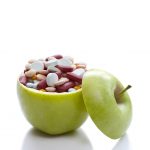AdviceParenting Advice
New Zealand Soil, it’s nutrients and your child’s health
This article examines child health in New Zealand by looking at areas we have soil nutrient deficiencies.
Our soil produces great grass but . . .

Seeing a green paddock full of cows or sheep would make you think our soil is the best you can get get. While our soil is great for growing cows and sheep it does have some deficiencies when it comes to human health because it is generally low in the essential nutrients of selenium, zinc, magnesium and iodine. Plants need these compounds in the soil they grow in if the food they produce is to have these nutrients. Limited amounts of these nutrients in the soil will mean the fruit or vegetables will also have a limited supply.
Iodine is essential for normal brain development and thyroid functioning. Iodine is usually found in fruit, grains and vegetables, but they get their iodine from the soil they grow in. That’s the problem, as our soil doesn’t have much iodine.
Magnesium is essential for formation of bones and teeth and assists in the absorption of calcium and potassium. It is needed to give the body energy. Heart health also needs this important mineral. The source of magnesium is green vegetables, nuts and some whole grains. It is also important for a good night’s sleep.
Zinc is essential for body functions involving energy and metabolism. It’s also great for our immune system. Meat, cereals, beans, peas, eggs and seafood are sources of zinc.
Selenium is an anti-oxidant that works with vitamin E to protect cell membranes from damage. Research is studying whether selenium plays a role in lowering the risk of lung, prostate, stomach and colorectal cancer. Foods with high selenium content are Brazil nuts, poultry, seafood, wholegrain, onions, garlic, mushrooms, and brown rice. Again the plants need selenium in the soil if it’s to be absorbed into the plant.
In New Zealand we recommend John Appleton’s health supplements. If you wish to seek expert medical advice for your child with regards to allergies, ADHD, behaviour problems, Autism, recurrent infections or nutrition we recommend Dr Leila Masson
Kiwi’s are getting bigger!
1977: 10% of adults obese, 34% overweight
1997: 17% obese, 35% overweight
2009: 28% obese, 37% overweight
In a recent nutrition report by the Ministry of Health, New Zealand obesity rates have soared compared to a decade ago. For men 27.7 % are obese compared to 17% in 1997. For women the rate is 27.8% compared to 20.6% in 1997. Professor Jim Mann of Otago University calls the statistics alarming: “New Zealand is high up in the ranks of the global pandemic of obesity. It reminds us that we have got a terrible problem.” His answer to the problem is better nutritional choices. Here is the Mayo Clinics, one of Americas top medical institutions, top ten foods. If you want to be healthy you can’t get better than these foods:
Nature’s Health and wonder foods:
- Almonds. Rich in fibre, riboflavin, magnesium, iron and calcium. They’re great for healthy hearts.
- Apples. The pectin in apples helps lower blood cholesterol and glucose levels. They’re also an excellent source of vitamin C.
- Blueberries. Research has found these magic berries are full of phytonutrients that help prevent chronic disease. They improve short-term memory and promote healthy aging. Full of fibre and vitamin C.
- Broccoli. This is also an excellent source of phytonutrients that prevent diseases like heart disease, diabetes, and some cancers. It’s also full of vitamin C and vitamin A.
- Red beans. Full of fibre and rich in iron, phosphorous and potassium. They also contain phytonutrients.
- Salmon. The benefits of omega-3 fatty acids are well established. Hearts love omega-3 and it promotes healthy immune functioning.
- Spinach. Pop-eye was onto a good thing with spinach. High in vitamin A and C and folate it helps boost our immune system and keeps the hair and skin healthy. It also contains compounds that help our vision.
- Sweet potatoes. This beaut yellow vegetable is full of beta carotene that the body converts into vitamin A – the vitamin that keeps you looking young, so it’s got to be good. They also are excellent sources of vitamin C, fibre, vitamin B-6 and potassium.
- Vegetable juice. All the benefits of the original vegetables presented in a delicious nutritious drink. Here is a great way to include vegetables in your child’s diet as well. Tomato juice contains many health benefits. It contains an antioxidant called lycopene that may reduce the risk of heart attack and prostate cancer.
- Wheat germ. Sprinkle some wheat germ on your breakfast cereal each morning for a health boost. Wheat germ is the part of the seed that develops and grows the new plant sprout. It contains folate, magnesium, phosphorus and zinc.
(Adapted from Mayo Clinic Health Newsletter; New Zealand Herald, 16 October, 2011)



